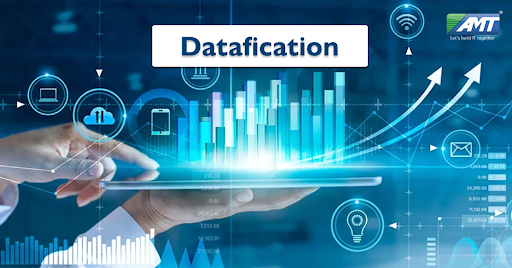Datafication is a concept that refers to the process of transforming various aspects of the world, including human behavior, activities, and processes, into data. This involves the collection, analysis, and utilization of data from different sources to gain insights, make decisions, and improve various aspects of life, business, and society. The term “datafication” is often associated with the growing importance of data in the modern digital age.
Key points about datafication include:
- Data Generation: Datafication involves the generation of data from a wide range of sources, including sensors, devices, social media interactions, online transactions, and more. As technology becomes more integrated into daily life, the amount of data generated continues to increase exponentially.
- Data Analysis: Once data is collected, it can be analyzed using various data analytics and machine learning techniques. This analysis can reveal patterns, trends, and insights that may not be apparent through traditional means.
- Decision-Making: Datafication supports data-driven decision-making across various domains, including business, healthcare, education, and government. Organizations use data to make more informed choices and optimize their operations.
- Personalization: Datafication enables personalization in various applications, such as personalized product recommendations, content suggestions, and marketing strategies. This improves user experiences and engagement.
- Privacy and Ethical Concerns: The extensive collection and use of data raise concerns about privacy and ethics. It’s important to balance the benefits of datafication with individuals’ rights to data privacy and security.
- Data Economy: Data has become a valuable commodity, leading to the emergence of data-driven business models and industries. Companies may monetize data directly or indirectly by offering data-related products and services.
- Smart Cities: In urban planning and development, datafication plays a role in creating smart cities. Sensors and data analytics are used to optimize traffic management, energy consumption, and public services.
- Healthcare: Datafication is transforming healthcare by enabling the collection and analysis of patient data to improve diagnoses, treatment plans, and overall healthcare outcomes.
- Education: In education, datafication can help tailor learning experiences to individual students through personalized content and assessment analytics.
- Social Implications: Datafication has social implications, including concerns about surveillance, bias in algorithms, and the digital divide. Addressing these issues is essential for ensuring equitable access to the benefits of data-driven technologies.
Datafication is an integral part of the broader data revolution and digital transformation, and it continues to evolve as technology advances and society becomes increasingly interconnected through data.
Here are some additional points and examples to further illustrate the concept of datafication:
- IoT and Datafication: The Internet of Things (IoT) is a significant driver of datafication. IoT devices, such as smart thermostats, wearable fitness trackers, and connected vehicles, continuously generate data that can be analyzed to improve efficiency, monitor performance, and enhance user experiences.
- Datafication in Retail: Retailers use datafication to track customer behavior in physical and online stores. This includes analyzing purchase histories, clickstream data, and even in-store tracking through technologies like beacons. This information helps retailers optimize inventory, offer personalized recommendations, and create targeted marketing campaigns.
- Financial Services: In the financial industry, datafication is crucial for risk assessment, fraud detection, and algorithmic trading. Banks and fintech companies use vast amounts of data to make real-time decisions and enhance customer experiences.
- Social Media and Datafication: Social media platforms are prime examples of datafication. They collect and analyze user-generated content, interactions, and demographic information to deliver personalized content, advertisements, and recommendations. This data also fuels sentiment analysis and social listening tools.
- Datafication in Sports: Sports teams and organizations utilize datafication to gain insights into player performance and strategy. Player tracking technology, wearable devices, and video analysis contribute to data-driven coaching decisions and player recruitment.
- Manufacturing and Industry 4.0: In manufacturing, the concept of Industry 4.0 involves the datafication of production processes. Sensors embedded in machinery and production lines monitor performance and predict maintenance needs, optimizing production efficiency.
- Datafication and Education Analytics: Educational institutions use datafication to track student performance, attendance, and engagement. Learning analytics help educators identify students who may need additional support and improve overall educational outcomes.
- Datafication and Healthcare Records: Electronic health records (EHRs) are a prime example of datafication in healthcare. Patient data is digitized and can be analyzed to identify trends, improve patient care, and conduct medical research.
- Datafication in Agriculture: Precision agriculture relies on datafication to optimize crop yields and resource usage. Sensors, drones, and satellite imagery collect data on soil conditions, weather patterns, and crop health to inform farming decisions.
- Environmental Monitoring: Datafication is crucial for monitoring and addressing environmental issues. It allows scientists and policymakers to collect and analyze data on climate change, air quality, water resources, and biodiversity.
- Transportation and Mobility: Datafication is transforming transportation with the rise of ride-sharing services and autonomous vehicles. Data on traffic patterns, road conditions, and user preferences are used to optimize routes and improve safety.
- Datafication and Research: Researchers across various fields use datafication to collect and analyze data for scientific studies, surveys, and experiments. This accelerates the pace of research and enhances data-driven discoveries.
- Data Ethics and Governance: With the increasing importance of data, there is a growing emphasis on data ethics and governance. Regulations like GDPR (General Data Protection Regulation) and ethical guidelines are being established to protect individuals’ rights and ensure responsible data use.
Datafication is a transformative force in today’s interconnected world, shaping industries, society, and how we interact with technology. As it continues to evolve, it presents both opportunities and challenges that require careful consideration and responsible handling of data.
Above is a brief about Datafication. Watch this space for more updates on the latest trends in Technology
